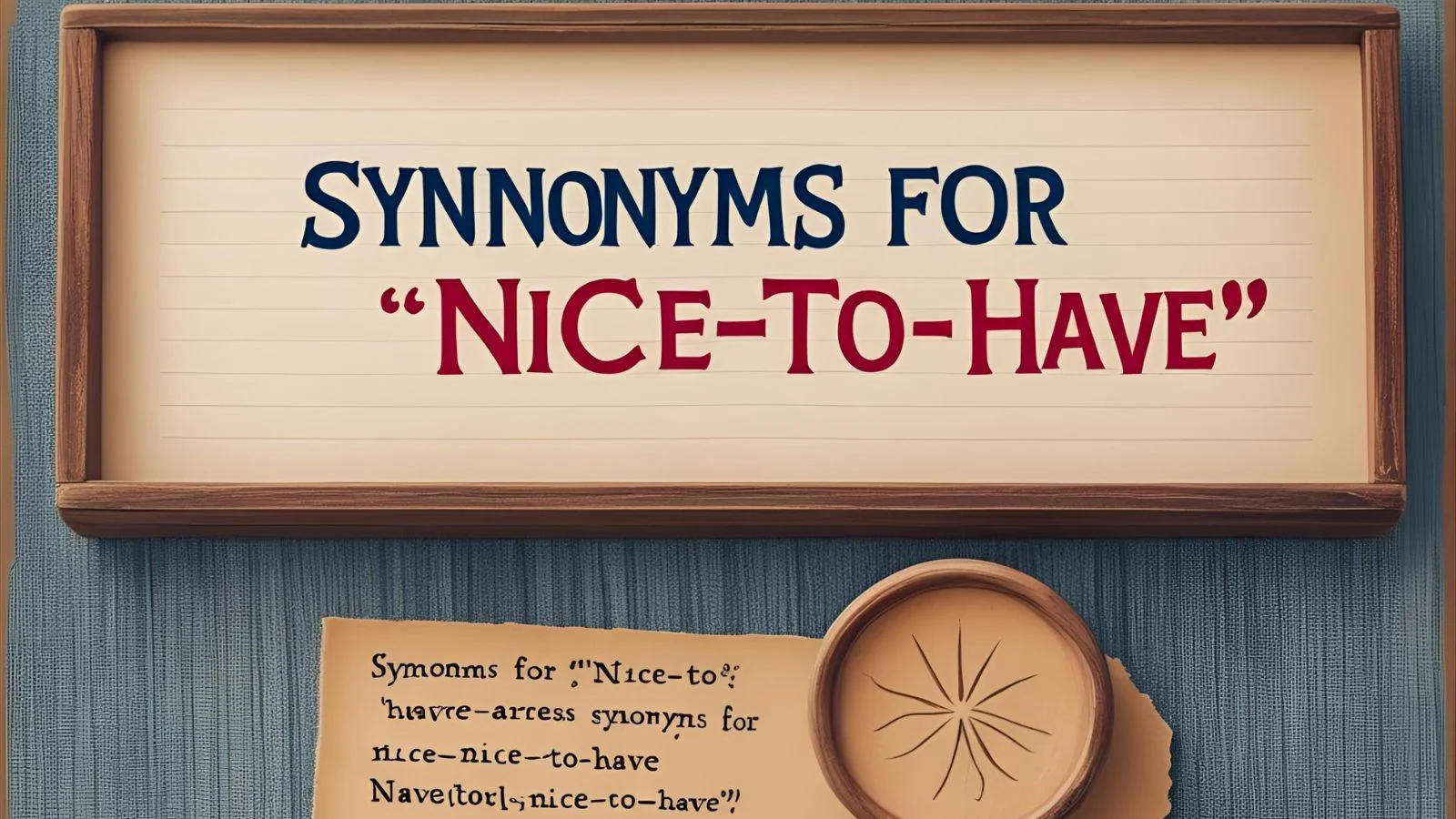In both professional and casual conversations, we often use the phrase “nice-to-have” to describe things that are beneficial but not essential. Whether in business, technology, job descriptions, or everyday life, there are plenty of alternative words and phrases that convey similar meanings. Having a diverse vocabulary helps improve communication, making it easier to express priorities and preferences. Synonyms for “Nice-to-Have”.
For example, in project management, a “nice-to-have” feature is one that enhances the user experience but isn’t required for functionality. In job postings, certain skills may be “nice-to-have” but not mandatory. Instead of repeatedly using the same phrase, choosing a synonym can add clarity and variety to your speech or writing.
This article explores a range of synonyms for “nice-to-have,” providing context for each. Whether you’re writing a business proposal, engaging in a debate, or simply improving your vocabulary, these alternatives will help you express ideas with precision and style.
Additional Benefit
An “additional benefit” refers to an extra advantage that enhances the overall value of something but isn’t strictly required. In business settings, companies may offer perks such as flexible work hours or wellness programs, which serve as additional benefits. These are not essential for job performance but improve employee satisfaction and productivity.
For customers, a loyalty rewards program or free shipping might be considered an additional benefit when choosing between competing brands. The term is frequently used in marketing, where companies highlight added perks to attract consumers.
When discussing priorities, using “additional benefit” instead of “nice-to-have” makes it clear that something enhances the experience but is not a fundamental requirement. It is particularly useful in persuasive writing, presentations, and negotiations where emphasizing value is crucial.
Read More: Other Ways to Say “I’m Here for You”
Bonus Feature
A “bonus feature” refers to an extra element that enhances a product, service, or experience. Unlike a core feature, a bonus feature is not mandatory but adds excitement and value. This term is commonly used in technology, entertainment, and product design.
For example, when purchasing a software package, a built-in spell checker or dark mode might be a bonus feature that improves usability. In movies, deleted scenes or behind-the-scenes footage included in special editions can be described this way.
The phrase “bonus feature” suggests an element of surprise or delight, making it ideal for marketing campaigns and product descriptions. It captures the attention of customers and encourages them to appreciate extras that come with a purchase.
By using “bonus feature” instead of “nice-to-have,” you convey that something is enjoyable and valuable but not a strict necessity. This makes it a great choice for promotional materials and consumer-oriented communication.
Non-Essential Perk
A “non-essential perk” is an extra benefit that adds value without being a fundamental requirement. The term is commonly used in workplace settings, where perks such as remote work options, free snacks, or gym memberships are desirable but not mandatory for job performance.
For example, a company might offer an employee wellness program as a non-essential perk to improve morale and well-being. While employees appreciate these perks, they do not directly impact core job responsibilities.
In personal finance, discounts and cashback rewards can be considered non-essential perks when using credit cards. These extras make a financial product more appealing but do not define its primary function.
Using “non-essential perk” instead of “nice-to-have” helps highlight the distinction between must-haves and desirable additions. It is especially useful in professional discussions where prioritizing needs over luxuries is important.
Extra Advantage
An “extra advantage” refers to an additional benefit that enhances an experience, product, or decision-making process. It implies something beneficial that improves outcomes but is not a necessity.
For example, in job hunting, speaking multiple languages may provide an extra advantage in securing certain roles, though it might not be a mandatory requirement. In sports, having a supportive coach or access to advanced training facilities can be considered an extra advantage in an athlete’s development.
Marketers use this term to highlight product features that set their offerings apart. A smartphone with an extended battery life or a camera with advanced night mode could be advertised as providing an extra advantage over competitors.
By replacing “nice-to-have” with “extra advantage,” you emphasize the usefulness of an addition without implying that it is required. This makes the phrase particularly effective in sales, negotiations, and competitive environments.
Desirable Addition
A “desirable addition” is something that enhances an experience, product, or service but is not a core requirement. This term is useful in both professional and casual discussions where differentiating between necessities and enhancements is important.
For instance, in home design, features like a walk-in closet or heated flooring are desirable additions that improve comfort but are not essential. In workplace settings, mentorship programs and skill-development workshops serve as desirable additions that benefit employees but are not required job components.
Businesses often use this phrase in marketing to highlight extra features without overstating their importance. A car manufacturer might describe a sunroof or leather seats as desirable additions, making the vehicle more appealing to customers.
Using “desirable addition” instead of “nice-to-have” allows for clear communication, especially in decision-making processes where distinguishing between must-haves and optional extras is crucial.
Optional Extra
An “optional extra” is a feature or benefit that is available but not required. This phrase is commonly used in business, marketing, and consumer products to describe add-ons that enhance the experience but do not affect the core function.
For example, when purchasing a car, leather seats, a sunroof, or premium audio might be considered optional extras. These features improve comfort and enjoyment but are not essential for driving.
In event planning, live entertainment or gift bags for attendees could be described as optional extras. While they enhance the experience, the event can still proceed successfully without them.
Using “optional extra” instead of “nice-to-have” is particularly useful when discussing purchases, services, or features that customers can choose based on preference and budget. This phrase makes it clear that something is available but not required, helping people make informed decisions.
Value-Added Feature
A “value-added feature” refers to an additional element that increases the overall worth of a product, service, or experience. This term is frequently used in business and marketing to highlight extra benefits that make an offering more appealing.
For instance, a streaming service might include offline downloads or exclusive content as a value-added feature. These extras make the service more attractive without being necessary for basic functionality.
In the workplace, professional development programs or mentorship opportunities can be considered value-added features. They enhance an employee’s growth but are not core job requirements.
Using “value-added feature” instead of “nice-to-have” emphasizes the benefit of the addition rather than its optional nature. It is particularly effective in sales and advertising, where businesses aim to showcase what makes their offerings stand out.
Luxury Item
A “luxury item” refers to something that enhances comfort, status, or enjoyment but is not essential. This phrase is often used in fashion, automobiles, and lifestyle branding to describe high-end products that offer exclusivity and prestige.
For example, designer handbags, high-performance sports cars, and five-star hotel stays are considered luxury items. They provide enhanced experiences but are not necessary for daily life.
In the business world, executive lounges, premium travel perks, and gourmet catering services can be categorized as luxury items. While they add value, they are not required for operations.
Using “luxury item” instead of “nice-to-have” conveys a sense of indulgence and exclusivity. This phrase is particularly effective in branding and marketing strategies where businesses want to appeal to consumers seeking premium experiences.
Preferred Option
A “preferred option” describes something that is desirable but not strictly necessary. This phrase is commonly used in decision-making scenarios, allowing individuals or organizations to highlight favorable choices without making them mandatory.
For instance, when hiring, an employer might list certain skills as a preferred option rather than a requirement. This means candidates with those skills have an advantage but are not automatically disqualified without them.
In travel, a window seat or extra legroom might be a preferred option for passengers who want more comfort, but they can still complete their journey without it.
Using “preferred option” instead of “nice-to-have” clarifies that while something is beneficial, it is not essential. This makes it a great choice for professional, academic, and customer-oriented discussions.
Supplementary Feature
A “supplementary feature” is an additional element that supports or enhances something without being necessary for its function. This term is often used in product development, education, and technology.
For example, an online course might offer downloadable worksheets as a supplementary feature. While these materials help students learn, they are not required to complete the course.
In software, a customizable user interface or an AI-powered assistant might be considered a supplementary feature. These additions make the experience more efficient but are not critical to core operations.
Using “supplementary feature” instead of “nice-to-have” highlights that something adds value without being integral. It is particularly effective in industries where extra features improve usability and user satisfaction.
Extra Convenience
An “extra convenience” refers to something that makes life easier or more enjoyable without being a necessity. This phrase is commonly used in hospitality, technology, and consumer goods.
For example, mobile banking apps provide an extra convenience for customers by allowing them to manage accounts remotely. While traditional banking is still possible, the app simplifies transactions.
In travel, priority boarding and express security lanes offer extra convenience to passengers, making their journey smoother but not affecting their ability to fly.
Using “extra convenience” instead of “nice-to-have” highlights that something is beneficial without being required. It is a great phrase for marketing and customer service, where ease and efficiency are key selling points.
Ancillary Benefit
An “ancillary benefit” is an additional advantage that supports a primary function but is not the main reason for choosing something. This term is frequently used in healthcare, finance, and corporate benefits.
For example, health insurance plans often include wellness programs as an ancillary benefit. While medical coverage is the main offering, these programs provide extra value to policyholders.
In business, networking events or free industry reports might be considered ancillary benefits of joining a professional organization. They add value but are not the primary reason for membership.
Using “ancillary benefit” instead of “nice-to-have” conveys that something is an extra advantage without being essential. This phrase is particularly useful in formal writing and business discussions.
Discretionary Perk
A “discretionary perk” is a benefit provided based on choice or preference rather than necessity. This term is often used in employment, customer service, and luxury services.
For example, a company may offer employees annual bonuses as a discretionary perk. While salaries are required, these bonuses depend on company performance and management decisions.
In hospitality, complimentary room upgrades for frequent guests can be considered a discretionary perk. They enhance the experience but are not guaranteed.
Using “discretionary perk” instead of “nice-to-have” emphasizes that something is a privilege rather than an entitlement. This phrase is ideal for professional and service-based industries.
Unnecessary Enhancement
An “unnecessary enhancement” refers to something that improves an experience but is not required for functionality. This term is often used in technology, design, and entertainment.
For example, a smartphone with a 200-megapixel camera is an unnecessary enhancement for most users. While it improves photo quality, a lower-resolution camera would still be sufficient.
In home design, voice-activated lighting systems provide an unnecessary enhancement. They offer convenience but are not essential for daily living.
Using “unnecessary enhancement” instead of “nice-to-have” highlights that something is an upgrade rather than a need. This phrase is useful in critical discussions where distinguishing between essentials and luxuries is important.
Optional Luxury
An “optional luxury” is a premium feature or experience that provides enjoyment but is not necessary. This term is often used in travel, hospitality, and lifestyle branding.
For example, staying in a five-star hotel or flying first class is an optional luxury. These experiences enhance comfort but are not required for travel.
In the workplace, having a private office instead of a shared workspace might be considered an optional luxury. While it offers privacy, employees can still perform their job in an open-plan setting.
Using “optional luxury” instead of “nice-to-have” communicates exclusivity and indulgence. It is an effective phrase for marketing high-end products and services.
Non-Essential Addition
A “non-essential addition” refers to something that enhances an experience or function but is not necessary for its core purpose. This term is commonly used in business, technology, and lifestyle discussions.
For example, a smartphone with a foldable screen is a non-essential addition. While it may look futuristic, traditional screens still serve the same purpose effectively.
In the workplace, an on-site gym or free snacks might be considered non-essential additions. They contribute to employee satisfaction but are not crucial for job performance.
Using “non-essential addition” instead of “nice-to-have” makes it clear that something is extra without being required. This phrase is ideal for discussions about upgrades, luxury features, or secondary benefits in various industries.
Peripheral Feature
A “peripheral feature” is an element that supports the main function but is not central to it. This phrase is often used in product development, technology, and business strategies.
For instance, a smart TV with voice control is a peripheral feature. While voice activation is convenient, users can still operate the TV with traditional buttons or a remote.
In software, dark mode might be a peripheral feature. It improves user experience but does not change the app’s core functionality.
Using “peripheral feature” instead of “nice-to-have” helps emphasize that something is supportive but not a primary requirement. It is a precise term for technical and business-related conversations.
Desirable Option
A “desirable option” is something that people would prefer to have but can still function without. This phrase is commonly used in marketing, sales, and service industries.
For example, a car with heated seats is a desirable option. It enhances comfort, especially in winter, but is not necessary for driving.
In job postings, knowledge of a second language might be listed as a desirable option. While it can be beneficial, candidates without this skill may still qualify for the role.
Using “desirable option” instead of “nice-to-have” highlights preference rather than necessity. This phrase works well in professional and consumer-related discussions where choices are presented.
Convenience Bonus
A “convenience bonus” refers to something that makes a task easier or more enjoyable but is not essential. This phrase is frequently used in product design, hospitality, and travel industries.
For instance, mobile check-in at a hotel is a convenience bonus. While it speeds up the process, guests can still check in at the front desk.
In cars, automatic parking assistance is a convenience bonus. It helps drivers park effortlessly, but manual parking is still an option.
Using “convenience bonus” instead of “nice-to-have” highlights the practical advantages of an additional feature. It is especially useful in consumer-oriented discussions.
Bonus Perk
A “bonus perk” is an extra benefit that adds value but is not required. This phrase is commonly used in workplace benefits, customer rewards, and travel experiences.
For example, free coffee at the office is a bonus perk. Employees appreciate it, but it is not a necessity for work.
In retail, a store offering free gift wrapping is a bonus perk. It enhances customer experience but does not affect the core purchase.
Using “bonus perk” instead of “nice-to-have” makes something sound like a special advantage rather than an essential component. It is a great choice for discussions about added benefits and rewards.
Conclusion
Expanding your vocabulary with precise synonyms for “nice-to-have” allows you to communicate more effectively. Whether you use “non-essential addition,” “peripheral feature,” or “bonus perk,” each term conveys a different nuance.
These alternatives help clarify whether something is optional, supportive, or a luxury. By selecting the right phrase, you can make your writing more engaging and persuasive in both professional and casual settings.










